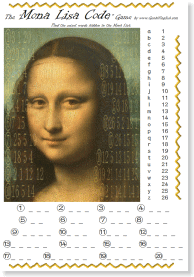
Target_English: Phonics Decoding ( i.e. reading short words)
Target Grade: Upper Elementary - Junior High
Using pop culture in the classroom can be a fantastic way to bring the
kids' outside world into the classroom. But with this game you should exercise
a bit of caution. The title will work in getting lots of kids interested
in trying the game, and I have changed the title on the worksheet to be
the "Mona Lisa Code" instead of the more provocative "Da
Vinci Code", but if you think that even one of your students may be
offended by it then please don't use it.
This game is a little tougher than most of the Genki English games so it's
probably better for older kids, or junior high school students and above.

1. Give each student ( or group of 5 students ) a copy of the print out
above
2. Choose which code to start with and shout out this number.
3 The kids find the circled version of this number on the sheet.
4. They decode the secret word from the numbers that follow.
5. They shout out what the word is.
6. Quickest team is the winner.
7. Repeat from 2
For example, the first code, ![]() , is really easy, it consists of the numbers 3 1 20. You use the code table
to figure out this means "c a t ". The kids then use their phonics skills to read the word "cat" and shout it out.. That's basically
the main aim of the game, to get some basic phonics reading practice. As
with any phonics activities, the kids have to be able to speak a fair bit
of basic English first though.
, is really easy, it consists of the numbers 3 1 20. You use the code table
to figure out this means "c a t ". The kids then use their phonics skills to read the word "cat" and shout it out.. That's basically
the main aim of the game, to get some basic phonics reading practice. As
with any phonics activities, the kids have to be able to speak a fair bit
of basic English first though.
It's also good to choose the codes in a random order. If you simply start
with code ![]() , then move onto
, then move onto ![]() , the kids will be able to work the codes out in advance and the slower
kids will gradually get further and further behind. If you choose the numbers
in a random order it keeps the kids on their toes and means the slower
kids can keep up with their faster classmates. For the same reason some
of the codes are hard to read, to balance things out.
, the kids will be able to work the codes out in advance and the slower
kids will gradually get further and further behind. If you choose the numbers
in a random order it keeps the kids on their toes and means the slower
kids can keep up with their faster classmates. For the same reason some
of the codes are hard to read, to balance things out.
You could also use this as a worksheet filler in high school, simply give
the kids the sheet and ask them to fill it in. But it really has no English
learning value unless the kids actually speak the words they've decoded!
You could also get the kids to make their own codes. Or for higher level
kids, they can make their own sentences or short stories.
I've purposely not given you the answers here, it's more fun for the kids
if the teacher decodes each one at the same time as the students. They
sometimes do it quicker than you and feel very happy about it!
Enjoy.
Readers' Comments
I just tried this with a second-year junior high school class who have
been known to crawl under the table when asked to give their name, they're
that shy and demotivated. I divided the class into teams and tried it -
by the end they were jumping up and down yelling in English at me, and
after the lesson I heard them shouting English in the corridor. Miracle!
Thank you Genkienglish! - John
Readers' Comments
I played this with a group of 12-14 year old girls - they loved it. The
girls especially liked writing their own codes. One team wrote, 'We
love English'!! Fantastic site - thank you!
Readers' Comments
My elementary school loved it and it was a great introduction to Romanji
too! In fact my class was so stoked I went through the alphabet with
them afterwards and they were thoroughly into it. Now a few of my
3rd graders can even write the entire alphabet, WOW they picked that up
fast!
Using this game it was easy for them to copy numbers to letters and they
went wild afterwards coding their friends' names!
Fantastic, thanks! - Alex
Readers' Comments
Brilliant! This did exactly what I hoped it would do! I used it with a group
of 3rd year JHS students. The only problem I came across is the boys split up,
one half listening to the codes I called out, the other half doing the one's I
hadn't. So we only did about 5 fairly, and the rest they just called out the
moment I said a number. Maybe try preparing some other ones and writing them on
the board and then revealing them one at a time. That should keep things fair.
AWESOME game though, really! Cheers! --John
Readers' Comments
I have used this at all levels in Jr High and had outstanding responses every time. I teach somewhat advanced phonics to the kids as well (more than a = apple), and this game helps them see they CAN say words they haven't seen before if they learn the sounds.
I've used it with one Special Education class as well, and the students
there enjoyed it as well. Very good game. - C Tidwell
Sign up to get my top tips, games & hints via email! |
 |
|---|
|
|